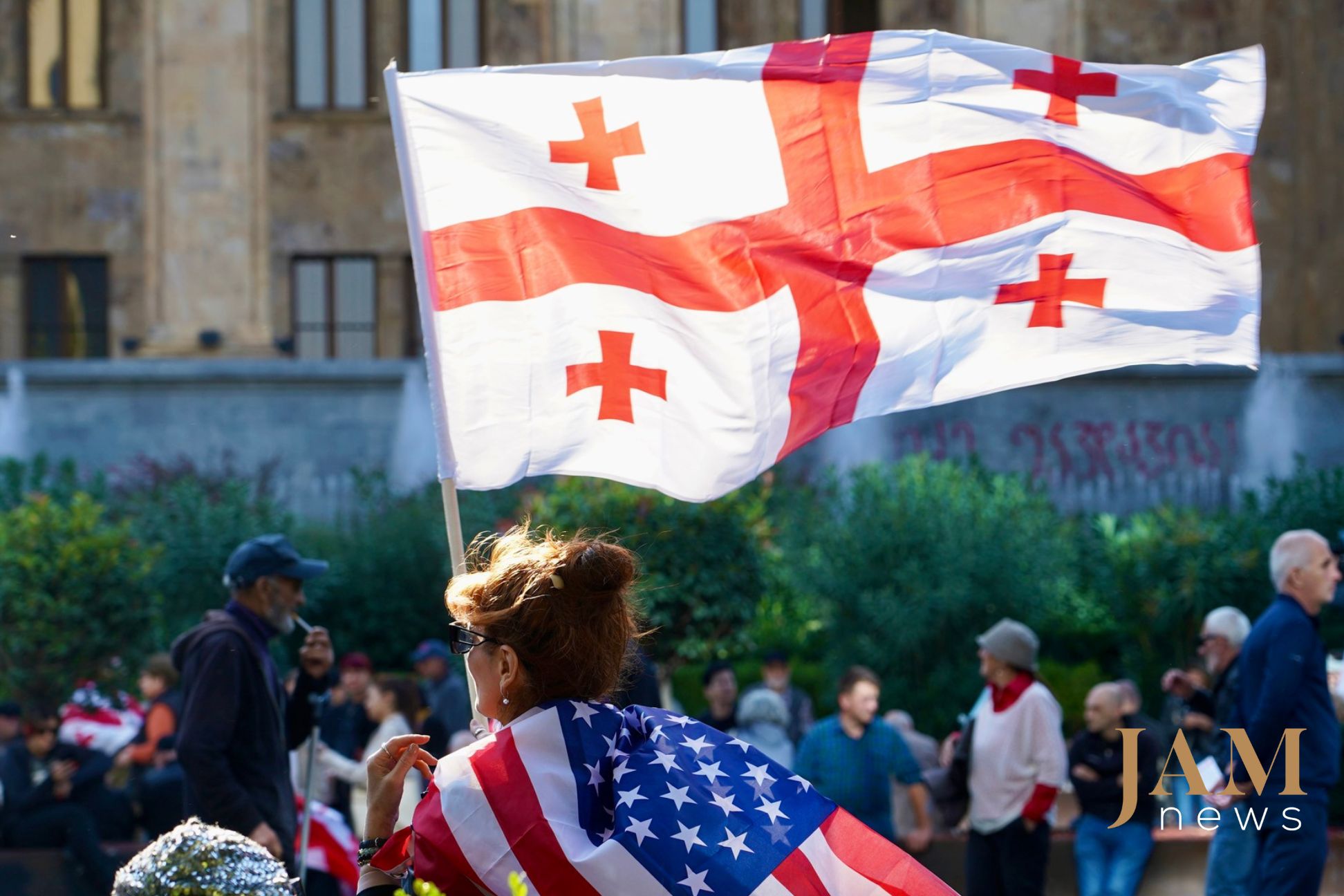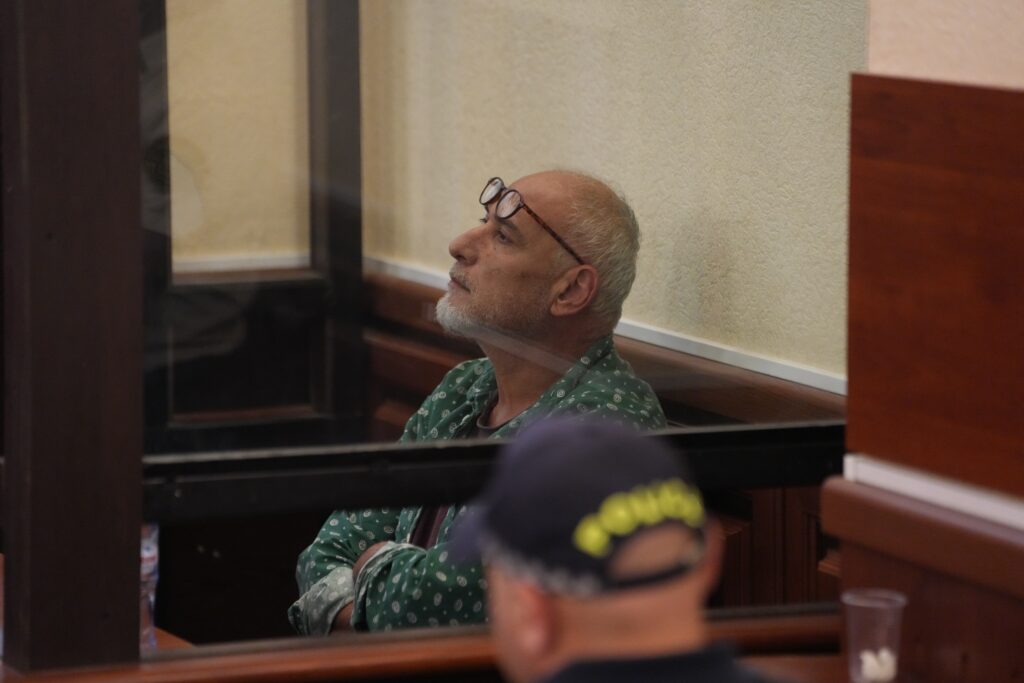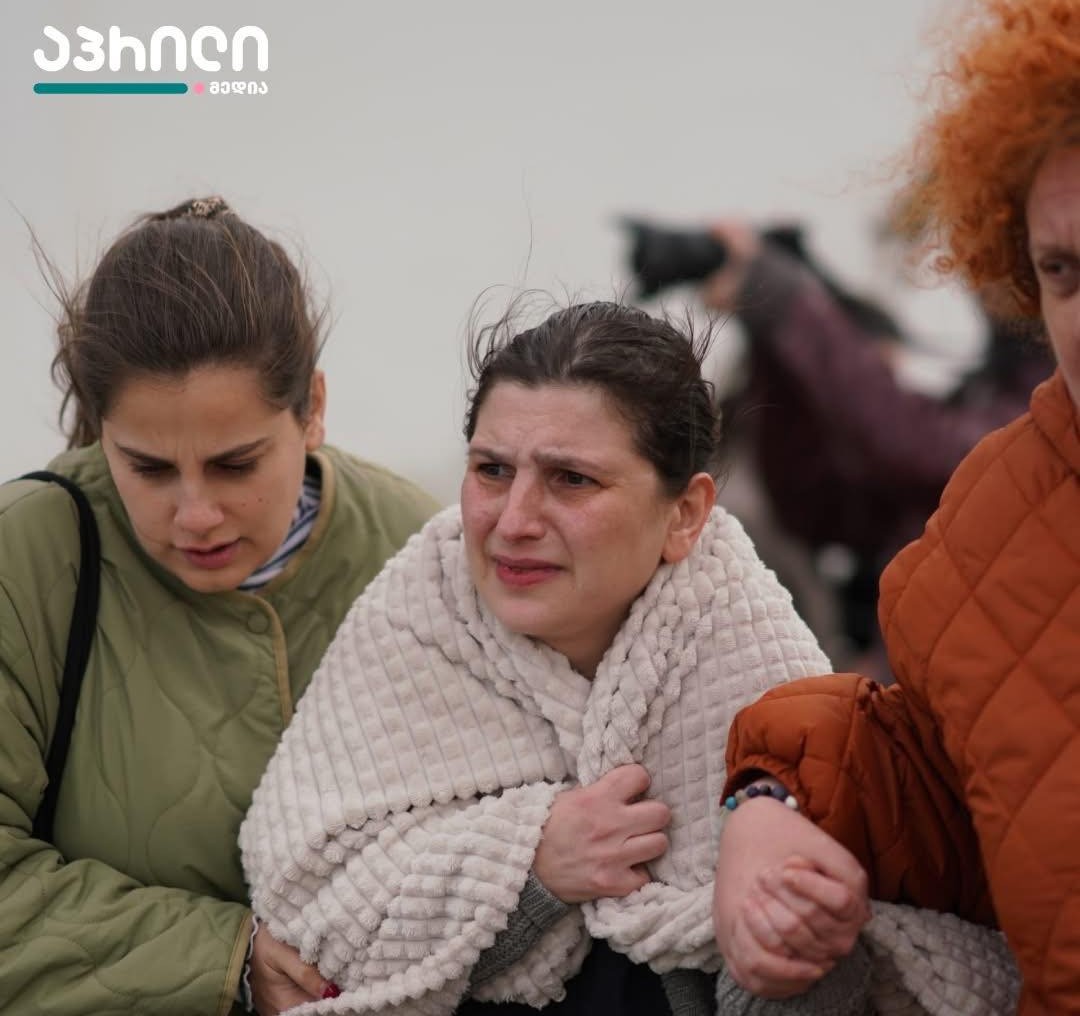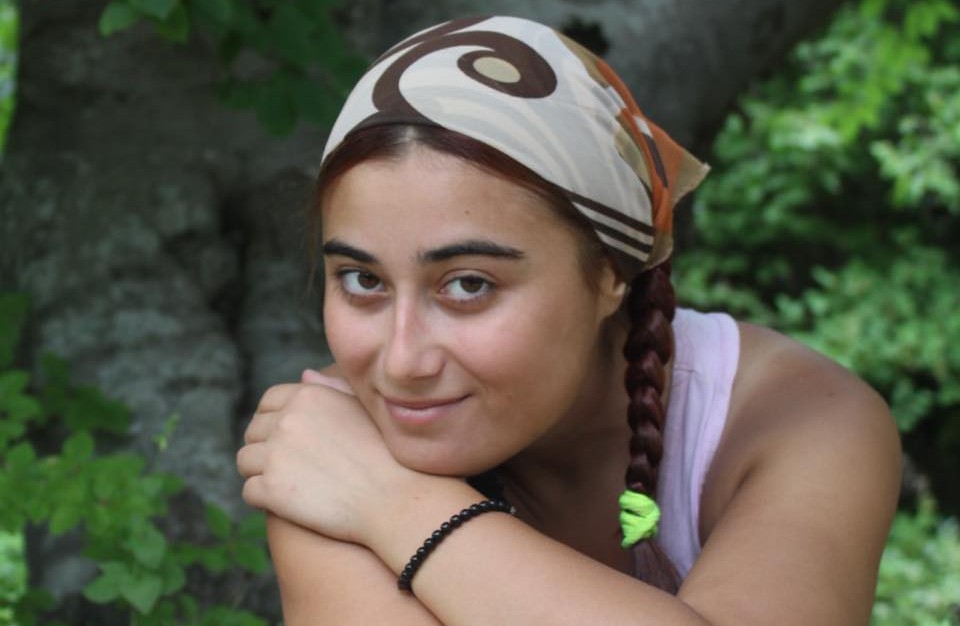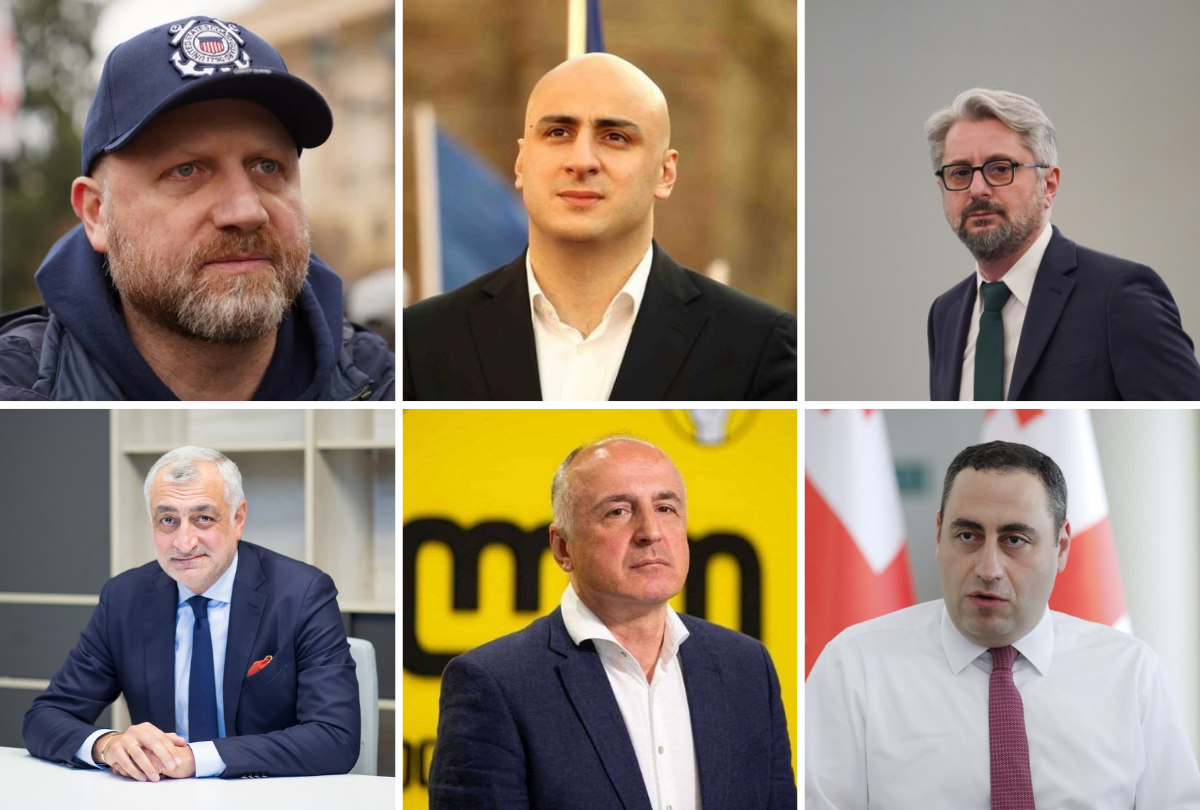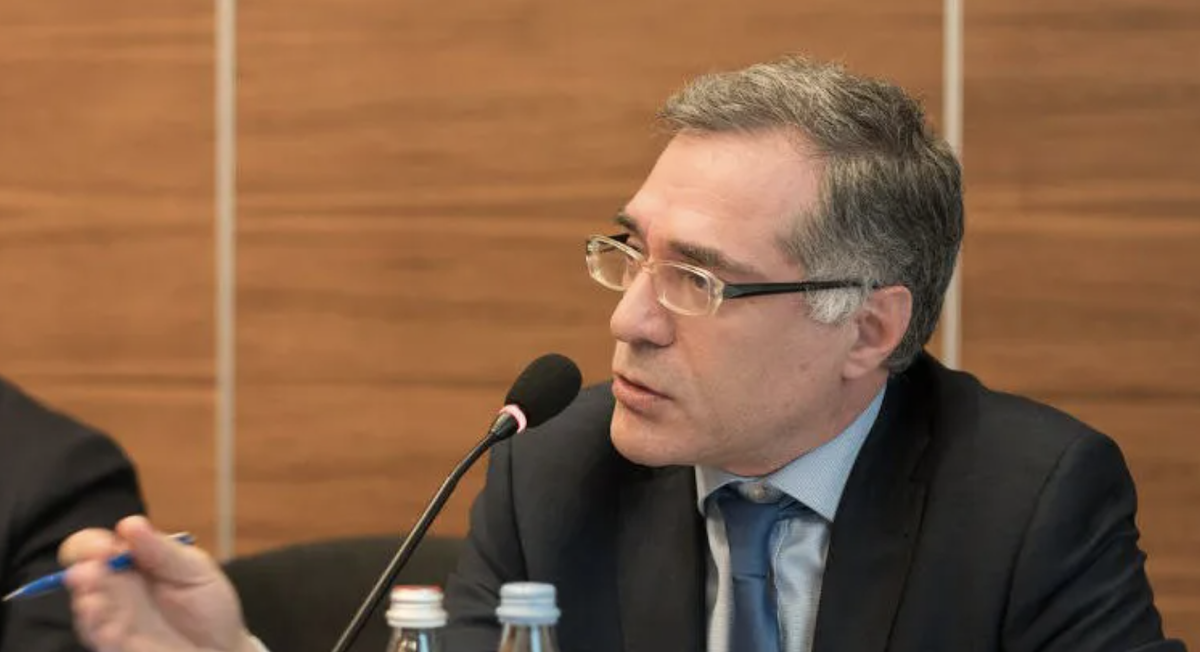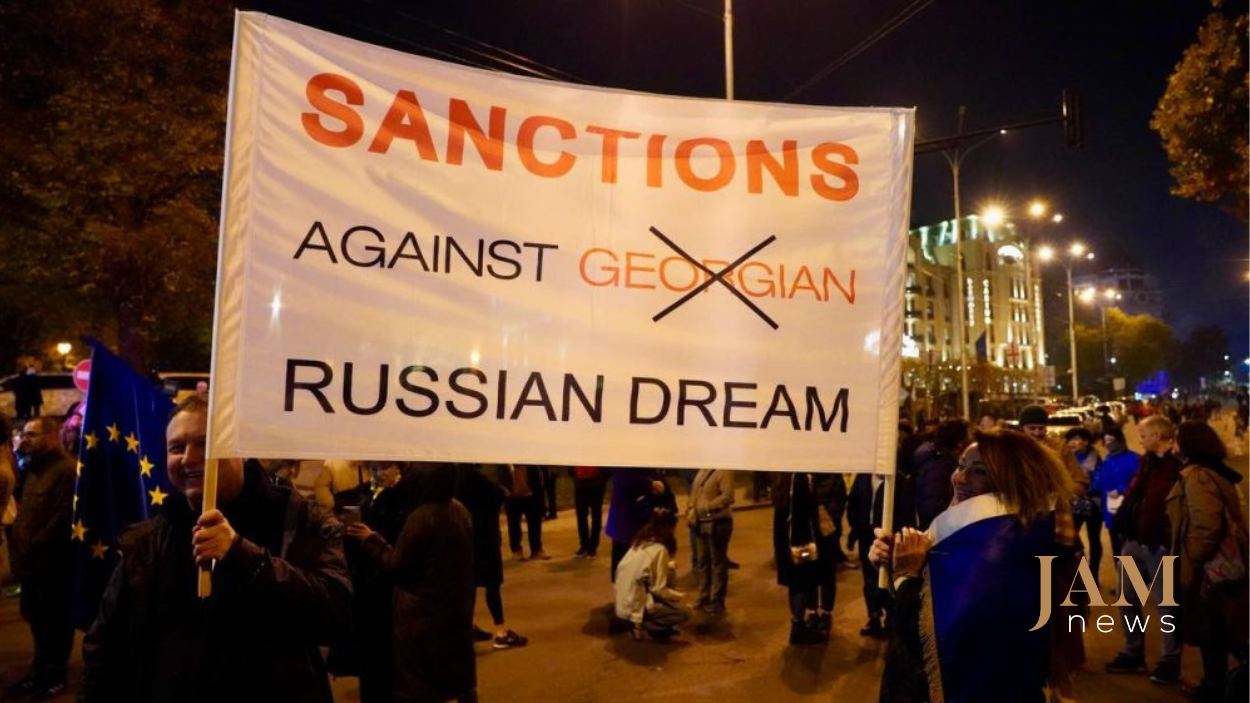One year on: What changed in Georgia since start of pro-EU protests?
One year of protests in Georgia
Since 28 November 2024, after Prime Minister Irakli Kobakhidze publicly announced that Georgia was suspending its bid for EU integration, the country has moved openly towards authoritarian rule.
For the first time in its history, Georgia has an illegitimate government and president. It has more than a hundred political prisoners, several hundred dismissed civil servants and hundreds of individuals under Western sanctions.
- German envoy in Georgia: ‘Georgia strayed from European path’
- European Commission report: Georgia must immediately halt its democratic backsliding
- Opinion: ‘European bodies deliver verdict on Georgia’s government’
Many international assistance programmes have been suspended, leaving the country effectively isolated from the West.
A series of repressive laws has been adopted, and many NGOs and independent media outlets have been shut down. Those that remain face open threats of repression and criminal prosecution from Georgian Dream.
Almost all opposition leaders are in prison. Those who are not have been charged. The Constitutional Court has formally banned the activities of three of the country’s largest opposition parties.
This article attempts to summarise the past year in figures. But the crackdown is ongoing, making it impossible to present fully accurate data at this stage.
Unrecognised, illegitimate and internationally isolated Georgian Dream
Over the past year, despite numerous attempts, Georgian Dream has failed to secure legitimacy or recognition either at home or abroad.
Mikheil Kavelashvili, chosen by a special council of 300 people, is widely regarded as an illegitimate president.
Leaders of Georgian Dream are no longer invited to high-level international meetings. At the same time, Georgia’s fifth president, Salome Zurabishvili, continues to receive invitations to international platforms and events.
🟥 The country has all but disappeared from the Western agenda. When Georgia is mentioned in a positive light at all, the reference is to the Georgian people — not to the government.
International assistance programmes for the Georgian government have been put on hold. On 9 December last year, it emerged that the UK government was pausing its support to the Georgian authorities. On 9 July, the EU ambassador to Georgia, Paweł Herczyński, announced that the EU had suspended a €30 million tranche intended to strengthen Georgia’s defence capabilities under the European Peace Facility (EPF).
Georgia has been shaken by uninterrupted protests for 365 days.
Large pro-European protests in Georgia began on 28 November 2024, the same evening Prime Minister Irakli Kobakhidze announced that talks on EU accession would be suspended until 2028. That day was only the third since the convening of the illegitimate 11th parliament.
Tens of thousands of people took to the streets to oppose Kobakhidze’s announcement. The pro-European protests that started that night have continued ever since.
🟥 Every evening for the past 365 days, a protest has taken place outside the parliament building in Tbilisi.
This is the first case of its kind in Georgia — and arguably beyond. The ruling party, Georgian Dream, has done everything possible to suppress the protests: passing repressive laws, arresting and fining demonstrators, using violence, and attempting to discredit the actions through propaganda — yet these efforts have not succeeded.
Around 300 protesters fell victim to abuse.
In the early days of the protests, police attacked demonstrators, used water cannons and tear gas, and detained and brutally beat participants.
🟥 Between 28 November and 28 January 2024, the Public Defender’s Office documented 282 alleged cases of abuse against protesters.
During this period, 55 people were hospitalized, many requiring surgery. Among them was Alexandre Keshelashvili, a journalist for the online outlet Publika, who suffered a broken nose.
About 120 people are in prison on criminal charges.
For the first time in the history of independent Georgia, the country has more than a hundred political prisoners.
Over the past year, there have been several waves of mass arrests. The first began in the autumn, immediately after the protests started. The second followed the “failed revolution” on 4 October 2025. The third occurred on 19 October, after Georgian Dream further tightened the rules for holding protests.
🟥Since the start of the protests, 122 people have faced criminal charges.
During the autumn protests, as part of the first wave of arrests, 54 people were detained. Forty-six of them have already faced trial: three were acquitted (Giorgi Akhobadze, Tedo Abramov, and Nika Katsia), five were released with fines (a professor from Batumi and four of his students), and the cases of eight people arrested near Tbilisi Mall are still under review; they remain out on bail.
Criminal cases were brought against 64 people after the 4 October protest, which aimed at a “peaceful overthrow of power.” Sixty-one of the 64 are now in prison.
The former head of the Operational Planning Department of the Special Tasks Division of the Interior Ministry, Irakli Shaishmelashvili, was not arrested, as he is outside Georgia. Activist Mariam Mekantsishvili, who has a minor child, was released on bail, as was Professor Giorgi Chakhunashvili. The court has only now begun considering the cases on their merits.
Poet and pro-European protester Zviad Ratiani was also arrested on criminal charges and sentenced to two years in prison. Teacher and protester Nino Datashvili faces charges of assaulting a bailiff.
Criminal charges have been filed against Zurab Menteshashvili, arrested for the second time for blocking a road during a protest, and Tamar Lortkipanidze, who climbed onto the roof of a police vehicle during the 22 October rally on Rustaveli Avenue.
This list does not include ten opposition leaders and members, who will be covered in a separate section. It also excludes ten people arrested in spring 2024 and several business figures considered personal prisoners of Bidzina Ivanishvili.
More than 600 people have been arrested on administrative charges.
Since 28 November, hundreds of people have been arrested on administrative charges for various minor offences. There have been two waves of administrative arrests: in 2024, during the autumn rallies, and this year, after 19 October, when Georgian Dream tightened the rules for holding demonstrations and introduced criminal penalties for violations.
Exact figures are not available, as official authorities do not publish them. Multiple sources provide approximate data. According to a study by the NGO “Human Rights Crisis in Georgia,” during the first wave of arrests, the hotline of a network of NGOs received 1,087 calls for help. Some individuals were released after being issued a protocol, while others were detained. In total, 405 people were imprisoned.
Another source of information is the hotline of the opposition group “Coalition for Change.” Marika Arevadze, a coalition member and lawyer representing detainees, has data on 203 arrests since 19 October (figures as of 26 November — JAMnews).
If these figures are combined and potential unreported cases are taken into account, it can be estimated that:
🟥 More than 600 people have been arrested on administrative charges over the past year.
Many of those arrested since 19 October are women. Marika Arevadze was last able to analyse the data in the first week of November, and even then, 50 women were already among the detainees. More than half of those arrested were sentenced to several days of administrative detention, ranging from a minimum of three to a maximum of 14 days.
Between 800 and 1,200 people have been dismissed from public service.
The repression by Georgian Dream has also affected public servants. Immediately after Irakli Kobakhidze announced the suspension of EU integration, employees across various agencies issued collective statements in support of Georgia’s accession to the European Union, guaranteed under Article 78 of the constitution.
Georgian Dream responded by urgently passing amendments to the Law on Public Service, which simplified the process for dismissing officials. By January 2025, mass layoffs of civil servants had begun.
🟥 The independent trade union “Article 78 of the Constitution” criticised the dismissal of between 800 and 1,200 civil servants.
This trade union was formed by people recently dismissed from public service. They are attempting to challenge their dismissals in court. At this stage, it is difficult to determine the exact number of layoffs for several reasons. Co-founder Taya Makarashvili explains that, first, not everyone reported their dismissal; second, some have not taken legal action; and third, not all have contacted the union.
Nevertheless, there are approximate figures. In April 2025, Transparency International Georgia reported the dismissal of 700 civil servants. The layoffs did not stop there — on 25 November 2025, it was reported that more than 60 employees of the National Centre for Examinations and Assessments had been dismissed.
Ten opposition figures are in prison, including party leaders. Three opposition parties face the threat of being banned.
🟥 Ten opposition leaders are in prison. Some of their sentences are nearing completion, but Georgian Dream has filed new charges that could extend their imprisonment by several more years.
Some were arrested for failing to appear before an investigative commission set up by the illegitimate parliament to probe the actions of the United National Movement government from 2004–2012. Others face charges related to the attempted coup on 4 October 2025.
Currently, leaders of the “Coalition for Change” have been sentenced to prison for failing to appear before the investigative commission: Nika Gvaramia (eight months), Nika Melia (eight months), and Zurab “Girchi” Japaridze (seven months).
The case of another opposition figure, Elene Khoshtaria, is still ongoing. She was arrested for writing “Russian Dream” in marker on a campaign banner of Tbilisi Mayor Kakha Kaladze. Another coalition member, Gela Khasaya, is imprisoned on a fabricated charge of assaulting a stranger.
Giorgi Vashadze, leader of the “Strategy Agmashenebeli” party, was also sentenced to seven months for failing to appear before the commission. Another leader of the same party, Paata Mandjgaladze, was arrested in connection with the 4 October case.
The 4 October case also saw the detention of United National Movement leader Levan Habeishvili and two party members, Murtaz Zodelava and Irakli Nadiradze.
Another politician, former Georgian Defence Minister (2004–2006) Irakli Okruashvili, is also in prison. He is no longer active in politics, though he was once an opponent of Georgian Dream.
Several criminal cases have been filed against former Georgian Dream Prime Minister and current opposition figure Giorgi Gakharia, who faces up to 13 years in prison.
Leaders of “Lelo,” Mamuka Khazaradze and Badri Japrindze, were also arrested and sentenced to eight months for failing to appear before the commission. On 5 September 2025, they were pardoned by President Mikheil Kavelashvili and released.
This is far from a complete picture of the repression against the opposition. Georgian Dream intends to declare parties it opposes unconstitutional and bar their members from political activity.
A draft law prepared by the ruling party threatens to ban the three largest opposition parties. A related case has already been submitted to the Constitutional Court.
Six hundred attacks on journalists, restrictive media laws, and open threats — a climate of terror targeting the press.
Independent media have also faced unprecedented repression. Over the past year, intimidation, harassment, legal persecution, and both verbal and physical attacks on journalists have become a daily reality in Georgia.
🟥 The Centre for Media, Information and Social Research (CMIS), an organisation monitoring media issues, recorded 600 cases of pressure on journalists in Georgia over the past year.
Based on this data, Reporters Without Borders published a report on the Georgian media landscape, stating that since 28 November 2024, when the pro-European protests began, press freedom in Georgia has sharply deteriorated.
🟥 Over the past year, 14 media workers in Georgia — including journalists, photographers, and camera operators — have been arrested. Among them is Mzia Amaglobeli, founder of Batumelebi and Netgazeti, who was sentenced to two years in prison on a fabricated charge.
According to CMIS, journalists are also being detained on administrative grounds for blocking roads during protests. Most are sentenced to several days of administrative detention.
Georgian Dream is also seeking to restrict the activities of independent media through repressive laws.
🟥 Since spring 2025, the parliament has passed seven legislative amendments restricting media activity in Georgia.
These amendments effectively banned outlets from receiving foreign funding, significantly curtailed freedom of expression, prohibited photo and video recording in court, and increased state control over the media.
The repressive media laws have already begun to be enforced. The Anti-Corruption Bureau, responsible for monitoring compliance, has requested grant information from six media outlets.
In recent days, pressure on independent media has escalated. Georgian Dream has openly threatened independent online outlets with criminal liability. Parliament Speaker Shalva Papuashvili accused online media of committing criminal acts, claiming they are trying to bypass the law to secure foreign funding.
Four waves of repressive measures to suppress protests
Immediately after the pro-European protests began, Georgian Dream started introducing repressive amendments to the law, aimed at suppressing demonstrations.
The draconian measures, designed to minimise protest participation, began with increased fines and escalated to the introduction of prison sentences for minor offences.
🟥 Over the past year, Georgian Dream has introduced four changes to the legislation governing assemblies and demonstrations. The repressive amendments were passed by parliament on an accelerated schedule, within just a few days.
These amendments criminalised actions that were previously not punishable. Law enforcement powers were expanded, and fines for various violations were significantly increased.
The 13 December amendments banned the possession of lasers, wearing masks, and using pyrotechnics at rallies, with a fine of 2,000 lari for violations. At the same time, fines for posting protest posters on buildings were increased twentyfold, and fines for blocking roads rose tenfold (from 500 to 5,000 lari).
The 6 February amendments prohibited holding rallies in buildings without the property owner’s prior consent. The maximum period for administrative detention for violations was increased from 15 to 60 days.
The 2 July amendments established that anyone who failed to pay a fine for minor hooliganism, disobeying a police officer, insulting an official, or blocking a road, and then repeated the same offence, would face administrative detention for recidivism.
The latest amendments, passed on 16 October, allow up to 15 days’ detention for wearing a mask at a rally, possessing tear gas, or blocking a road. These amendments were adopted after it became clear that simply increasing fines was ineffective and people continued to gather on Rustaveli Avenue. Following these changes, mass administrative arrests of protesters began.
More than 1,000 people have been fined, many of them multiple times.
After Georgian Dream increased existing fines and introduced new ones for demonstrators, hundreds of people have been fined, most often for blocking roads during rallies. Some protesters who attend demonstrations almost daily have already accumulated fines totaling hundreds of thousands of lari.
For example, Gota Chanturia, a teacher and prominent participant in pro-European rallies, has received 73 fines totaling 365,000 lari. Opera singer and opposition figure Paata Burchuladze reported 50 fines before his arrest.
Non-governmental organisations tried to track fines for a while, but eventually this became impossible.
At the very least, the following facts are known:
🟥 Around 1,400 people have received assistance from a legal aid network set up by 12 NGOs in 2024. Lawyer Marika Arevadze is familiar with approximately 300 of them.
🟥 By March 2025, just over three months after the protests began, the total amount of fines had reached two million lari, according to the Young Lawyers’ Association of Georgia. Since March, this figure has likely at least doubled.
At the same time, Georgian Dream froze the funds of organisations that had been helping fined protesters pay their fines.
More than 230 sanctioned public officials, judges, and prosecutors
This repressive practice by Georgian Dream has not gone unnoticed in the West. For the first time in history, hundreds of Georgian citizens have been sanctioned by Western partners, including the US and EU member states.
🟥 More than 230 people in Georgia are under Western sanctions.
These figures were collected by Transparency International Georgia. According to the organisation, the identities of 141 individuals have been made public (see the full list), while the rest face anonymous visa and travel restrictions.
The list also includes people who were sanctioned in 2023 (the so-called judges’ case). However, following the large-scale repression of 2024–2025, the sanctions were tightened, and most Georgian citizens were added to the official lists during this period.
On 27 December 2024, the US Department of the Treasury imposed financial sanctions on the de facto ruler of Georgia, founder of the ruling Georgian Dream party, and billionaire Bidzina Ivanishvili.
It is also known that six Georgian citizens are on the Magnitsky list.
Members of Georgian Dream have already been forced to acknowledge the impact of these sanctions. Some publicly stated the need to obtain visas for travel to Europe. Additionally, the annual human rights dialogue between Georgia and the European Union, scheduled for 21 November, was recently cancelled due to the presence of a sanctioned individual in the Georgian delegation.
Georgian Dream was also forced to remove certain sanctioned individuals from leadership positions. For example, Interior Minister Vakhtang Gomelauri and Director of the Special Tasks Department of the Ministry of Internal Affairs Zviad Kharazishvili were suspended.
On the horizon: new waves of repression — how Georgian Dream plans to act
The repression by Georgian Dream is far from over. Although the relevant law has not yet come into force, restrictions on overseas voting for Georgian emigrants have already been announced.
🟥 Hundreds of thousands of Georgian emigrants will no longer be able to vote abroad.
Georgian Dream stated that polling stations abroad will no longer be opened because emigrant voters are “under the influence of foreign forces and do not know what is happening in their home country.” On 25 November 2025, the corresponding bill was approved in its first reading.
A major reform is also being prepared in the education sector. Experts have criticised the proposed changes, arguing that they will lower the quality of education in the country and move Georgian standards further away from Western ones.
🟥 Hundreds of young Georgian citizens will no longer be able to continue their studies at leading foreign universities if the education reform is implemented.
This is not the only ruling party initiative targeting young people. Georgian Dream is also introducing a bill to create a rehabilitation centre for minors who commit offences.
🟥 Minors who commit offences will be placed in a special facility.
NGOs have criticised this initiative as a serious violation of children’s rights.
One year of protests in Georgia










